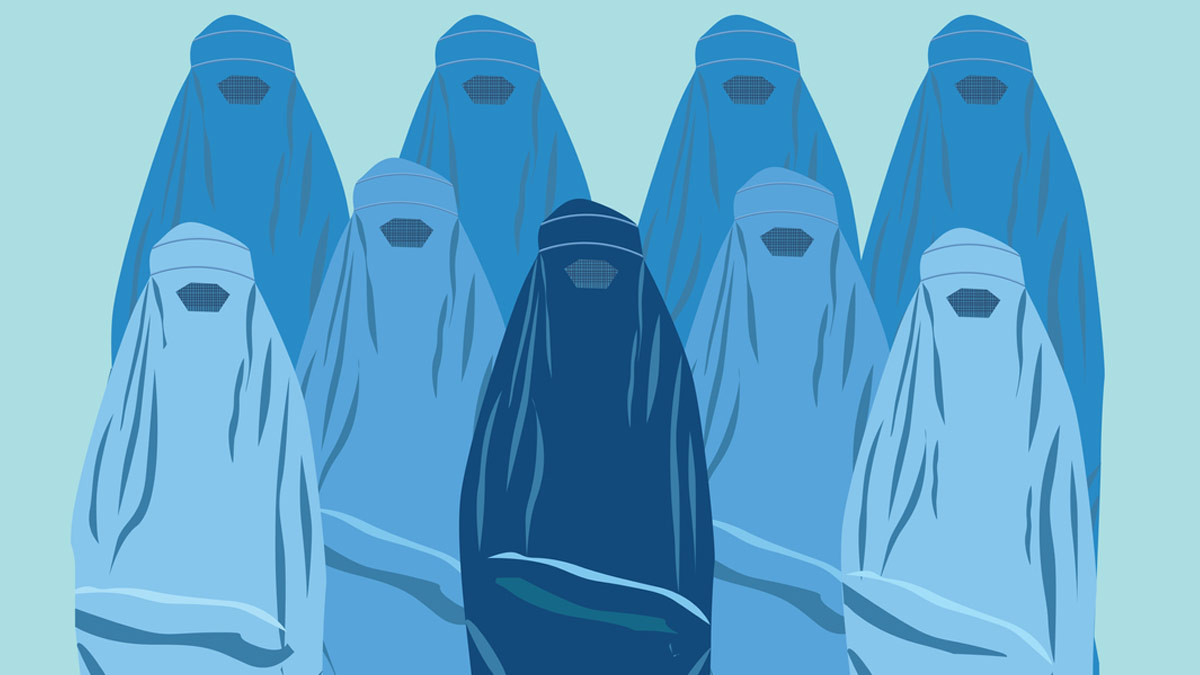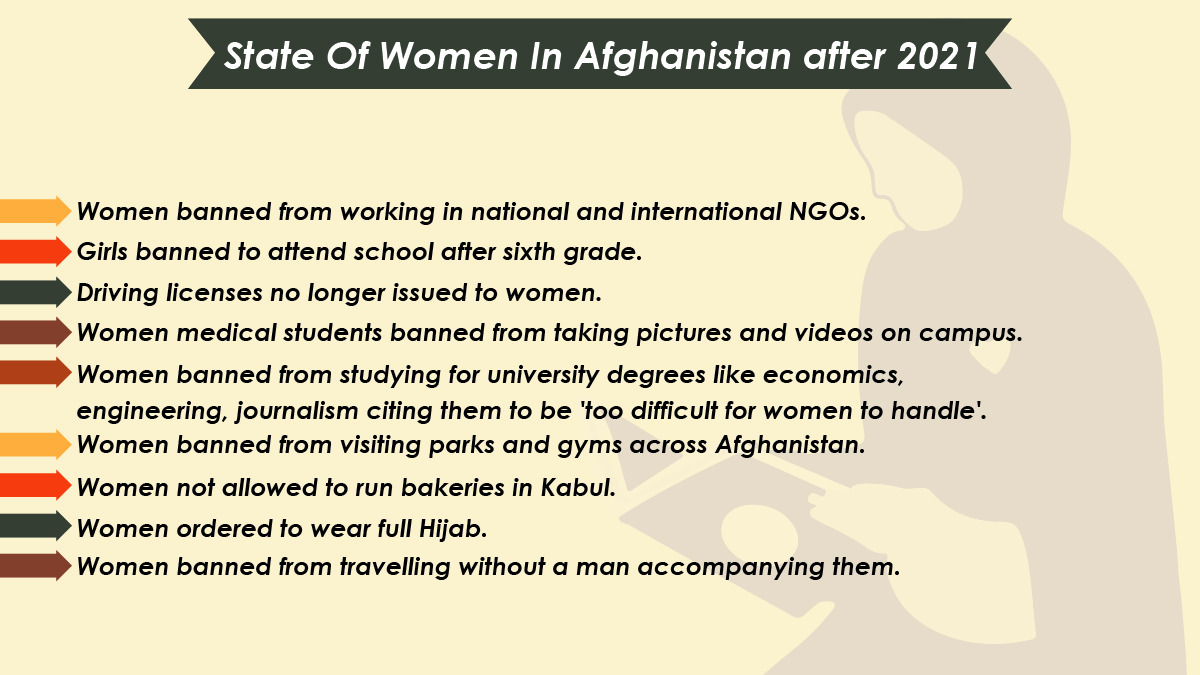
The condition of women in Afghanistan seems to be worsening by the day. On comparing the status of women in the nation today with back in the 90s, we only ended up finding more disturbing insights into the lives of girls and women in Afghanistan.Imagine inhaling in a space that restricts you at every turn, strips away your fundamental rights, and erases your very essence. Felt throttled? That's the current state of affairs for women in the Taliban. The mere envisioning of the scenario left us petrified.
The status of women in Afghanistan is disturbing, to say the least and unfortunately, the condition is only worsening by the day. Women in Taliban-ruled Afghanistan inhabit a world that confines them, deprives them of their basic rights, and has robbed them of their human worth.
According to the US Department Of State report, Taliban first came into limelight in the year 1994. In 1996, the Taliban took over the Afghan capital Kabul. While the world hoped for the Taliban to bring stability to Aghanistan, what happened next left the citizens horrified. The Taliban introduced Sharia law that took away women's right to work, access education and healthcare, dress the way they like, and the ability to move around the city. The enforcement of the law further led to increased crimes against women including abduction, forced marriage, and rape. (report)
While in the early 1990s, women majorly contributed to different professional spheres like teaching, medicine, and government work, post the Taliban take over, they were forced to quit their jobs as teachers, doctors, and nurses. Many women who had lost their husbands due to Afghanistan's civil war had no financial support and they ended up selling off their possessions and begging on streets to feed their families.
The Taliban completely restricted education for girls. In 1998, girls over 8 years of age were banned from attending school. Women were also prohibited from studying at Kabul University.
Under the Taliban rule, women had the right to access only basic healthcare and medical care. Women could get themselves examined only if they were fully dressed by a male physician at a hospital. Poor medical care led to a high infant and child mortality rate. It also led to an increase in maternal death during childbirth. Back then, as per a report by United Nations International Children's Emergency Fund (UNICEF), 165 out of every 1000 babies lost their lives before their first birthday.

Next, the Taliban forced women to wear burqa all the time. The burqa existed before Taliban rule as well, however, women had the choice to wear it based on their religion or personal preference. If women failed to wear a burqa, they were threatened, fined, and beaten on the spot. Women were not allowed to take off the garment no matter what, no exceptions were introduced. Women were expected to have their hands covered even when paying for food in the market. The rule also applied to girls 8 to 9 years of age.
Women were further oppressed as the Taliban restricted their movement around the city. They weren't allowed to step out alone. Women could only step out if accompanied by a male relative or they were at the risk of getting beaten up. If they took a taxi without a male relative, the taxi driver lost their license and was beaten up. Women were only allowed to use special buses for women which had windows covered with thick curtains.
After the September 11 attacks on the World Trade Center, the United States announced the beginning of war against Taliban-ruled Afghanistan. The US aimed at dismantling al-Qaeda, the militant organisation led by Salafi jihadists. US President, George W. Bush asked the Taliban government to hand over Osama Bin Laden (the militant responsible for the US 9/11 attacks) and remove of al-Qaeda militants from Afghanistan. The US invasion led to the removal of the Taliban from power and a new government was established in the country.

In the year 2021, the US and its allies announced their withdrawal from Afghanistan. After withdrawal, the Taliban once again came into power, leading to the collapse of the Afghan government and security forces. People from the Taliban's leadership once again took over the government, further leading to immediate concerns like the deprivation of human rights to women, imposition of strict Islamic law, and many Afghans fleeing the country to name a few.


Don't Miss: Salon To Gyms: A Look At Bans Imposed On Women In Taliban-Ruled Afghanistan To Crush Their Rights
Don't Miss: A Look At The Women Of Afghanistan One Year After Taliban Takeover
The data by UNWomen.Org only underlines a few decrees by the Taliban targetting the girls and women of Afghanistan after the takeover in 2021. The orders were quite similar to the ones issued back in the 1990s during the Taliban rule. Unfortunately, it all rolls down to the core objective of the Taliban to erase the existence of women from the country.

Taliban's course of action back in the 90s and now again after 2021 zeroes in on gender apartheid. The term in simple words means the discrimination of one sex using physical and legal practices and unfortunately, this is what women in the Taliban are being subjected to for decades now.
UN Human Rights Council, Richard Bennett, the Special Rapporteur on the situation of human rights in Afghanistan speaking of gender apartheid said, “Women and girls in Afghanistan are experiencing severe discrimination that may amount to gender persecution – a crime against humanity – and be characterised as gender apartheid, as the de facto authorities appear to be governing by systemic discrimination to subject women and girls to total domination.”

Shaharzad Akbar, Executive Director of Afghan NGO Rawadari also gave an insight into the mindset of women and girls in the country. He stated that women and girls feel 'buried alive' since they are only breathing and have no access to doing anything else due to the restrictions imposed on them.
The Taliban's rule has turned Afghanistan into a country where girls and women can no longer dream and there seems no glimmer of hope. It is beyond disappointing to see that the country has failed to get any humanitarian aid and support from neighbouring countries, and other Afghan stakeholders to address the issues faced by girls and women.
UN Women under its Gender Alert in December 2021 report proposed three recommendations - (report)
Also watch this video
Herzindagi video
Our aim is to provide accurate, safe and expert verified information through our articles and social media handles. The remedies, advice and tips mentioned here are for general information only. Please consult your expert before trying any kind of health, beauty, life hacks or astrology related tips. For any feedback or complaint, contact us at [email protected].